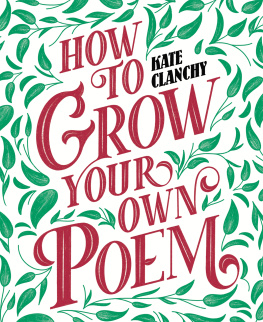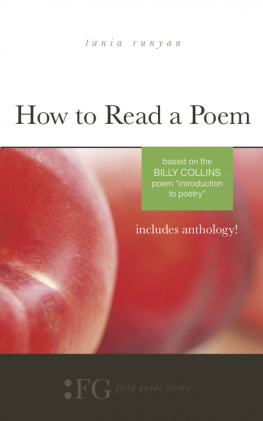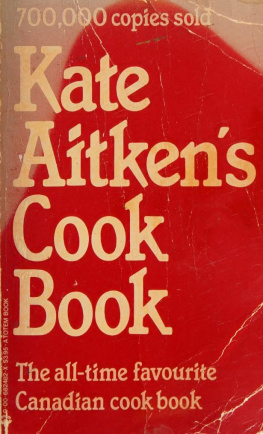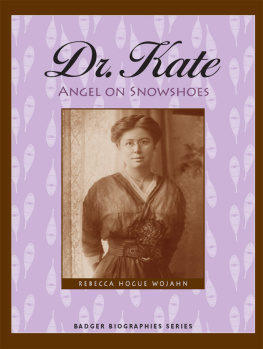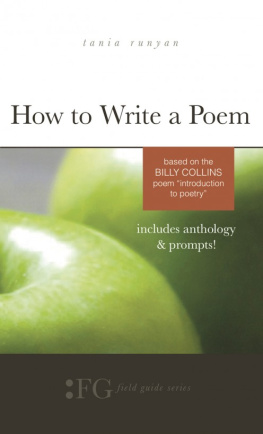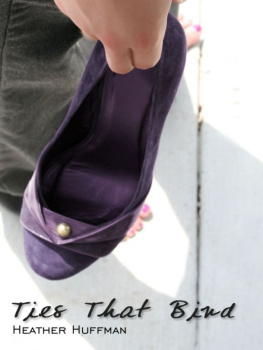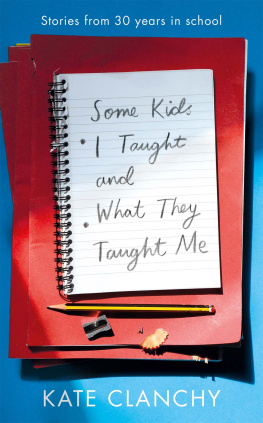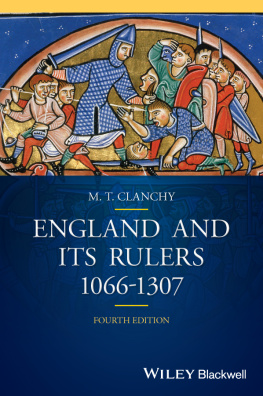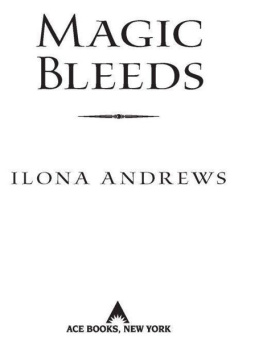Kate Clanchy - How to Grow Your Own Poem
Here you can read online Kate Clanchy - How to Grow Your Own Poem full text of the book (entire story) in english for free. Download pdf and epub, get meaning, cover and reviews about this ebook. publisher: Pan Books, genre: Romance novel. Description of the work, (preface) as well as reviews are available. Best literature library LitArk.com created for fans of good reading and offers a wide selection of genres:
Romance novel
Science fiction
Adventure
Detective
Science
History
Home and family
Prose
Art
Politics
Computer
Non-fiction
Religion
Business
Children
Humor
Choose a favorite category and find really read worthwhile books. Enjoy immersion in the world of imagination, feel the emotions of the characters or learn something new for yourself, make an fascinating discovery.
- Book:How to Grow Your Own Poem
- Author:
- Publisher:Pan Books
- Genre:
- Rating:5 / 5
- Favourites:Add to favourites
- Your mark:
- 100
- 1
- 2
- 3
- 4
- 5
How to Grow Your Own Poem: summary, description and annotation
We offer to read an annotation, description, summary or preface (depends on what the author of the book "How to Grow Your Own Poem" wrote himself). If you haven't found the necessary information about the book — write in the comments, we will try to find it.
How to Grow Your Own Poem — read online for free the complete book (whole text) full work
Below is the text of the book, divided by pages. System saving the place of the last page read, allows you to conveniently read the book "How to Grow Your Own Poem" online for free, without having to search again every time where you left off. Put a bookmark, and you can go to the page where you finished reading at any time.
Font size:
Interval:
Bookmark:
 Kate Clanchy is a writer, teacher and journalist. Her poetry collection Slattern won a Forward Prize. Her short story The Not-Dead and the Saved won both the 2009 BBC National Short Story Award and the V. S. Pritchett Memorial Prize. Her novel Meeting the English was shortlisted for the Costa Prize.
Kate Clanchy is a writer, teacher and journalist. Her poetry collection Slattern won a Forward Prize. Her short story The Not-Dead and the Saved won both the 2009 BBC National Short Story Award and the V. S. Pritchett Memorial Prize. Her novel Meeting the English was shortlisted for the Costa Prize.
Her BBC Radio 3 programme about her work with students was shortlisted for the Ted Hughes Prize. In 2018 she was appointed MBE for services to literature, and an anthology of her students work, England: Poems from a School, was published to great acclaim. In 2019, she published Some Kids I Taught and What They Taught Me, a book about her experiences as a teacher; it won the Orwell Book Prize for Political Writing 2020. She tweets as @KateClanchy1.
I believe that composing poetry is a fundamental human activity, like dance or singing, something we need to do and of which, even more than dance or music, we are deprived in the modern world. As a result, I believe there may be a lot of people with a poem-shaped hole in their lives. In fact, Im sure there are, because so many people tell me so: not just the young people I teach, and their parents, friends and teachers, but all sorts of people of all ages, in all sorts of contexts. Some days I think its everyone. This book is practical because it is based on a teaching practice. Ive been teaching people, old and young, to write poetry for more than twenty years.
In that time, I have accumulated a number of techniques, exercises, pieces of advice and above all, poems, which I have found to actually work: by which I mean they consistently seem to help people write more fluently and confidently, more as themselves. The very best and most useful of them are assembled here. I have sorted this material into sections so that we have separate segments at the end of chapters on the theoretical Permission to Write and the more tangible Room to Write. Bits of writing advice, meanwhile, have been attached to poems where they seemed particularly relevant, but also have their own headings so you can find them again for a different context. Ive ordered the book so we begin with directed, supportive exercises and end with challenging, free-form ones. Inevitably, though since writing poems is a multi-dimensional, holistic activity, and so is the process of helping someone with it everything overlaps. So, though this book will make sense if worked through from end to end, it can also be read forwards, backwards and sideways while making your own connections, much as a poem can.
It can also be mined for teaching ideas, or enjoyed as an anthology of poems, or as a collection of thoughts about poetry. I hope, though, that most readers will use it practically, and get on with the writing. Because when people tell me they want to write, Ive found it best in practice not to linger on what is stopping them that will always emerge later but to show them a poem and invite them to answer it with one of their own. Your invitation is over the page.

Almost nobody finds that easy. Here are four poems to get started with. Think of them as magic spells to build your sense of entitlement and permission. The Table by Edip Cansever Some People by Rita Ann Higgins What I Learned at University by Kate Bingham A View of Things by Edwin Morgan All these poems work because they have strong rhetorical structures. You can borrow them, and, like scaffolding, they will hold your writing up. Put It All Down:
A Place for Your Feelings: The Table Edip Cansever was a poet who also ran a carpet shop in the Grand Bazaar in Istanbul.
He mixed his real, tangible trade with his intellectual life every day and believed that poems should also come from life and find their own forms. This beautiful, deceptively simple, poem is the fruit of that way of being. This poem will not let you down. If you use its frame to hold your own experience you will create something beautiful. Start by reading this poem several times, possibly out loud. The Table A man filled with the gladness of living Put his keys on the table, Put flowers in a copper bowl there.
He put his eggs and milk on the table. He put there the light that came in through the window, Sounds of a bicycle, sound of a spinning wheel. The softness of bread and weather he put there. On the table the man put Things that happened in his mind. What he wanted to do in life, He put that there. Those he loved, those he didnt love, The man put them on the table too.
Three times three make nine: The man put nine on the table. He was next to the window next to the sky; He reached out and placed on the table endlessness. So many days he had wanted to drink a beer! He put on the table the pouring of that beer. He placed there his sleep and his wakefulness; His hunger and his fullness he placed there. Now thats what I call a table! It didnt complain at all about the load. It wobbled once or twice, then stood firm.
The man kept piling things on. Edip Cansever, translated from the Turkish by Julia Clare Tillinghast and Richard Tillinghast
Even if it is you, though, use the third person (he or she or they) because that will give you a bit more distance and ease in the poem. Who is coming home? How are they feeling? A man full of...A child full of...Comes home. Now you need a place to put things down a sofa, a bed, a floor, a peg... And puts his bag on the... it doesnt matter, but it does have to be a real place, or thing. Now, he/she/they puts stuff down. They are concrete, tangible things. a phone... She puts them down on the floor/bed/sofa... a phone... She puts them down on the floor/bed/sofa...
Then he puts down some memories: The sounds and touches and smells of the day... What are they? Make sure they are all real sensual things. Things that exist, that can be tasted or felt or smelt or heard but are not there in the room right now. The weather. The hum of the computer. The sound of the stairwell.
There might be some memories from further back, too, but make sure they are all concrete and clear. Now he can put down some things that happened in his mind. Things that arent in the room, or that happened that day but are floating in the memory nevertheless. A wish. A sum. A formula.
A recipe or instruction. A line of poetry or a phrase from a song. Someones name. A worry. A person someone the protaganist loves or hates, what they said. Your poem is getting quite long now, and the pile of stuff is getting big.
Next pageFont size:
Interval:
Bookmark:
Similar books «How to Grow Your Own Poem»
Look at similar books to How to Grow Your Own Poem. We have selected literature similar in name and meaning in the hope of providing readers with more options to find new, interesting, not yet read works.
Discussion, reviews of the book How to Grow Your Own Poem and just readers' own opinions. Leave your comments, write what you think about the work, its meaning or the main characters. Specify what exactly you liked and what you didn't like, and why you think so.

